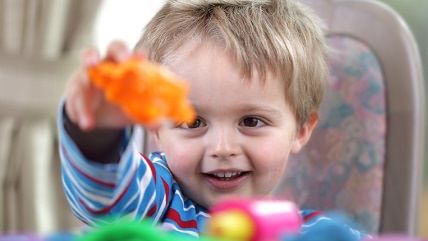Students Are Literally 'Hiding from Scary Ideas,' Or Why My Mom's Nursery School Is Edgier Than College
Safe spaces are infantilizing and insulting.


My mother is a nursery school teacher. Her classroom is a place for children between one and two years of age—adorable little tykes who are learning how to crawl, how to walk, and eventually, how to talk. Coloring materials, Play-Doh, playful tunes, bubbles, and nap time are a few of the components of her room: a veritable "safe space" for the kids entrusted to her expert care.
We'll come back to that in a minute.
Judith Shulevitz—formerly of The New Republic, where her eminently reasonable and fact-based perspective has been replaced by mean-spirited blathering—writes that college students now fear perspectives that clash with their own so deeply that they are quite literally hiding from them.
In a must-read op-ed for The New York Times, Shulevitz provides examples of the most egregious instances. At Brown University last fall, for instance, the prospect of a debate between leftist-feminist Jessica Valenti and libertarian-feminist (and Reason contributor) Wendy McElroy was so horrifying to some students—including Sexual Assault Task Force member Katherine Byron—that the creation of a "safe space" was necessary. McElroy's contrarian perspective on the existence of rape culture ran the risk of "invalidating people's experiences" and "damaging" them, according to Byron.
The safe space she created, as described by Shulevitz, sounds familiar to me:
The safe space, Ms. Byron explained, was intended to give people who might find comments "troubling" or "triggering," a place to recuperate. The room was equipped with cookies, coloring books, bubbles, Play-Doh, calming music, pillows, blankets and a video of frolicking puppies, as well as students and staff members trained to deal with trauma. Emma Hall, a junior, rape survivor and "sexual assault peer educator" who helped set up the room and worked in it during the debate, estimates that a couple of dozen people used it. At one point she went to the lecture hall — it was packed — but after a while, she had to return to the safe space. "I was feeling bombarded by a lot of viewpoints that really go against my dearly and closely held beliefs," Ms. Hall said.
It's my mother's classroom!
To say that the 18-year-olds at Brown who sought refuge from ideas that offended them are behaving like toddlers is actually to insult the toddlers—who don't attend daycare by choice, and who routinely demonstrate more intellectual courage than these students seem capable of. (Anyone who has ever observed a child tackling blocks for the first time, or taking a chance on the slide, knows what I mean.)
Lest anyone conclude that Brown must be a laughable outlier, read the rest of Shulevitz's essay:
A few weeks ago, Zineb El Rhazoui, a journalist at Charlie Hebdo, spoke at the University of Chicago, protected by the security guards she has traveled with since supporters of the Islamic State issued death threats against her. During the question-and-answer period, a Muslim student stood up to object to the newspaper's apparent disrespect for Muslims and to express her dislike of the phrase "I am Charlie." …
A few days later, a guest editorialist in the student newspaper took Ms. El Rhazoui to task. She had failed to ensure "that others felt safe enough to express dissenting opinions." Ms. El Rhazoui's "relative position of power," the writer continued, had granted her a "free pass to make condescending attacks on a member of the university." In a letter to the editor, the president and the vice president of the University of Chicago French Club, which had sponsored the talk, shot back, saying, "El Rhazoui is an immigrant, a woman, Arab, a human-rights activist who has known exile, and a journalist living in very real fear of death. She was invited to speak precisely because her right to do so is, quite literally, under threat."
You'd be hard-pressed to avoid the conclusion that the student and her defender had burrowed so deep inside their cocoons, were so overcome by their own fragility, that they couldn't see that it was Ms. El Rhazoui who was in need of a safer space.
Caving to students' demands for trigger warnings and safe spaces is doing them no favors: it robs them of the intellectually-challenging, worldview-altering kind of experience they should be having at college. It also emboldens them to seek increasingly absurd and infantilizing restrictions on themselves and each other.
As their students mature, my mother and her co-workers encourage the children to forego high chairs and upgrade from diapers to "big kid" toilets. If only American college administrators and professors did the same with their students.


Show Comments (317)